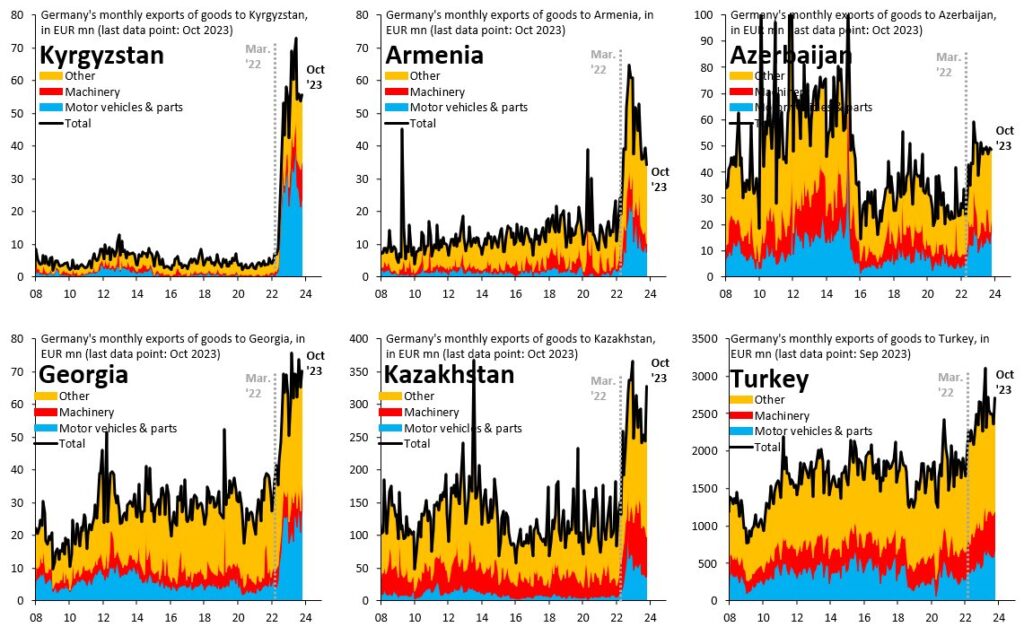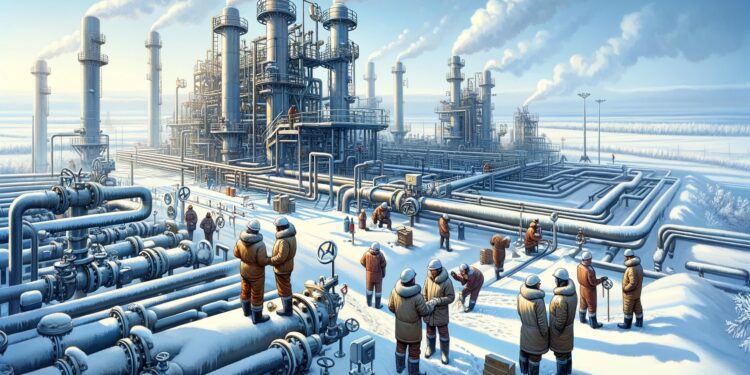It’s been almost two full years since Russia invaded Ukraine, prompting the West to impose unprecedented sanctions on Russia’s economy, which happened to be Europe’s main energy supplier at the time. To this day, Russia remains the world’s most sanctioned country, far surpassing other ‘revisionist’ states like Iran, Syria and North Korea.
One month after Russian tanks rolled across the border, President Biden announced that “the ruble was almost immediately reduced to rubble” and “the Russian economy is on track to be cut in half”. Likewise, the French Finance Minister Bruno Le Maire foresaw “the collapse of the Russian economy”. Russia “was ranked the 11th biggest economy in the world before this invasion,” Biden added. “Soon, it will not even rank among the top 20”.
How have these predictions panned out?
Not well. As an article in the FT notes, “Russia grew faster than all G7 economies last year and the IMF forecasts it will again in 2024”. So not only has the Russian economy failed to collapse – let alone be cut in half – but it’s actually growing at a steady clip. According to the IMF, Russia grew 2.6% in 2023, as compared to 0.8% in France, 0.5% in Britain and –0.3% in Germany.
A big problem for the West is that the stuff Russia sells – oil and gas – is extremely useful. So one way or another, countries are going to try to get their hands on it. This includes Europe. As of Q3 2023, Russia still accounts for 12% of the EU’s natural gas imports – and more than 20% of its fertiliser imports. In fact, EU imports of Russian LNG have jumped 40% since the invasion began so that EU countries now account for the majority of Russia’s LNG exports.
Another big problem is that Russia has a strong ally in China, the world’s second most powerful country and the main geopolitical rival of the US. While China has refrained from supplying lethal aid to Russia for sound strategic reasons, it absolutely wants to avoid a scenario where the Russian state falls apart. As I wrote of the Chinese last summer, “they can’t tolerate a defeated Russia but can easily live with a weakened one”.
Indeed, there’s strong evidence that China is helping Russia to evade Western sanctions. Since the war began, Chinese exports to Russia have grown 40%. And its exports to Russia’s neighbours have risen even more. China is now selling 63% more goods and services to Kazahkstan, and its exports to Belarus and Georgia have more than doubled. Did they suddenly unearth massive new markets in central Asia, or are they just selling sanctioned products through the back door?

Interestingly, the pattern is similar when you look at German exports (shown above). Shortly after the start of Russia’s invasion, the total value of goods sold to Kyrgyzstan, Armenia, Georgia and Kazakhstan went through the roof. As economist Robin Brooks notes, “it’s obvious this stuff is going to Moscow”.
If there’s strong demand for something, preventing people from supplying that thing is always an uphill battle. This is why prohibition didn’t work: people still wanted alcohol and as a result bootlegging became widespread. It’s the same with sanctioned products. The Russians still want them and are willing to pay hard currency, so sellers find a way around the sanctions.
Of course, the relative ineffectiveness of the sanctions against Russia’s economy isn’t the worst part. The worst part is they’re hurting Europe – including Britain.












To join in with the discussion please make a donation to The Daily Sceptic.
Profanity and abuse will be removed and may lead to a permanent ban.
A simple to the point common sense article, well done Noah.
European leaders are incompetent at their jobs, they seem to have a knack for backing the very worst scenario possible!
Incompetent?
Doesn’t it depend on what they are trying to achieve? If it is returning us to a pre-industrial state then they are quite competent.
Well, add that to the list of things that the our political and bureaucratic rulers have completely got wrong. Let’s review the list.
Feel free to add to the list.
In any case, it’s pretty much guaranteed that whatever societal project the ruling classes put their minds to you have an ironclad guarantee that it will be a total, catastrophic failure.
And they will blame the population for it. Every time.
“whatever societal project the ruling classes put their minds to…will be a total, catastrophic failure.”
The ruling classes are very good at getting people killed.
But they have been supremely successful in furthering the globalist agenda for their puppet masters, an agenda that has been flashing up in neon lights for 20 years or more. Sadly, the majority of people just don’t want to see those lights – somehow; it is just too uncomfortable a reality for them.
Economic sanctions have never worked: Rhodesia, South Africa, Iraq, Iran and so on and now Russia.
Sanctions are a cop out for politicians keen to be perceived as ‘doing something’ but who will not take difficult decisions about meaningful action.
With regard to Russia today, that means, for Britain, stationing a fully formed armoured division in Poland to deter the ever expanding ‘Union State’ of Russia and Belarus from expanding into Moldova and the Suwalki corridor, sealing off the Baltic States.
That’s what we did in West Germany during the Cold War and it worked.
Love the irony.
We won the Cold War conclusively.
The ‘peace dividend’ has been frittered away, squandered, and put our national security once more in jeopardy.
Yes that worked so well in 1939.
Wasn’t it Britain guaranteeing Poland’s borders in 1939 that kick-started WWII, led to Poland being invaded and occupied by Germany in the North and a week later by USSR in the South, then ultimately after much devastation, being subsumed by then Soviet Empire?
The last thing Poland should want is Britain ‘protecting’ them, and the last thing the British should want – Poland being of no interest to us.
Poland was invaded in 1939 by means of the Molotov Ribbentrop pact between Russia and Germany, nothing to do with Britain and France’s security guarantee.
Poland has already invited the British Army to station tanks there for training purposes.
Poland is very much of interest to us as one of our NATO partners. We already guarantee Poland’s security through Article 5 of the NATO Treaty.
The sanctions are working as intended, harming the UK and EU in a non lethal manner which is always uncle Sam’s strategic aim.
Business plan:
Infiltrate universities, culture. Buy politicians.
Promote net zero.
Shut down domestic energy production, ban fracking.
Destroy car industry and other manufacturing through green taxes quadrupling cost of energy.
Be a supplier of energy, cars, other manufactured goods.
Win-win.
(alleged) transcript of Tucker Carlson interview:
https://amg-news.com/bombshell-tucker-carlsons-exclusive-interview-with-vladimir-putin-in-moscow-full-transcript-released/
Sounds like Russia is the place to live It’s nowhere near as insane as the west!
What say you, Ian Rons? Should Ukraine negotiate now, albeit after a few hundred thousand deaths and from a worse position than peaceniks like me advocated before?
WHAT?!
SANCTIONS DON’T WORK?!
WHAT?!
SANCTIONS ARE COUNTERPRODUCTIVE?!
BAD OMENS!
CALL A MULLAH!
WE MUST SACRIFICE A GOAT!
Strange, because US and European Governments have been very successful at destroying their own Countries’ economies, so it’s not lack of talent, maybe just poor application.
The sanctions have clearly been disappointing but it is not quite so simple. Russia’s GDP contracted by 2.1% in 2022. So to some extend it is just making up lost ground. Also it is relatively easy to maintain GPD growth if you go mad on public sector spending – in this case primarily defence. The trouble is you get high inflation.
The Russians are grateful for the sanctions! “Thank you, Joe Biden”, they say. It simply meant that Russian companies were called upon to replace any products or services that were no longer available to them from foreign companies. So business inside Russia boomed. Furthermore, it means profits are being spent inland as opposed to being transferred abroad to mother companies.
And Ukraine could have remained neutral, without wanting to join NATO. That would have saved a few lives, would it not? It is surely not difficult to understand that Russia does not want nuclear missiles aimed at Moscow right on its border.
And if you want to sanction countries, how about sanctioning USA for their indiscriminate bombing of Irak and Syria, not to mention their support of Israel’s genocide of the Palestinian people? Oh dear, UK would have to sanction itself!
There could be so much peace and prosperity in the world if people would simply practise diplomacy instead of arms’ proliferation.
Tut tut.
How dare you refer to Israel cleansing themselves of Hamas as genocide.
This proves that where there is a will there is a way. Brexit should be a lot easier than this then, unless the ‘will’ is firmly set on doing everything to make sure it doesn’t succeed?
It’s worth keeping in mind that getting round the sanctions by importing through third parties makes life harder and more costly for Russia. So the sanctions are still a punishment.